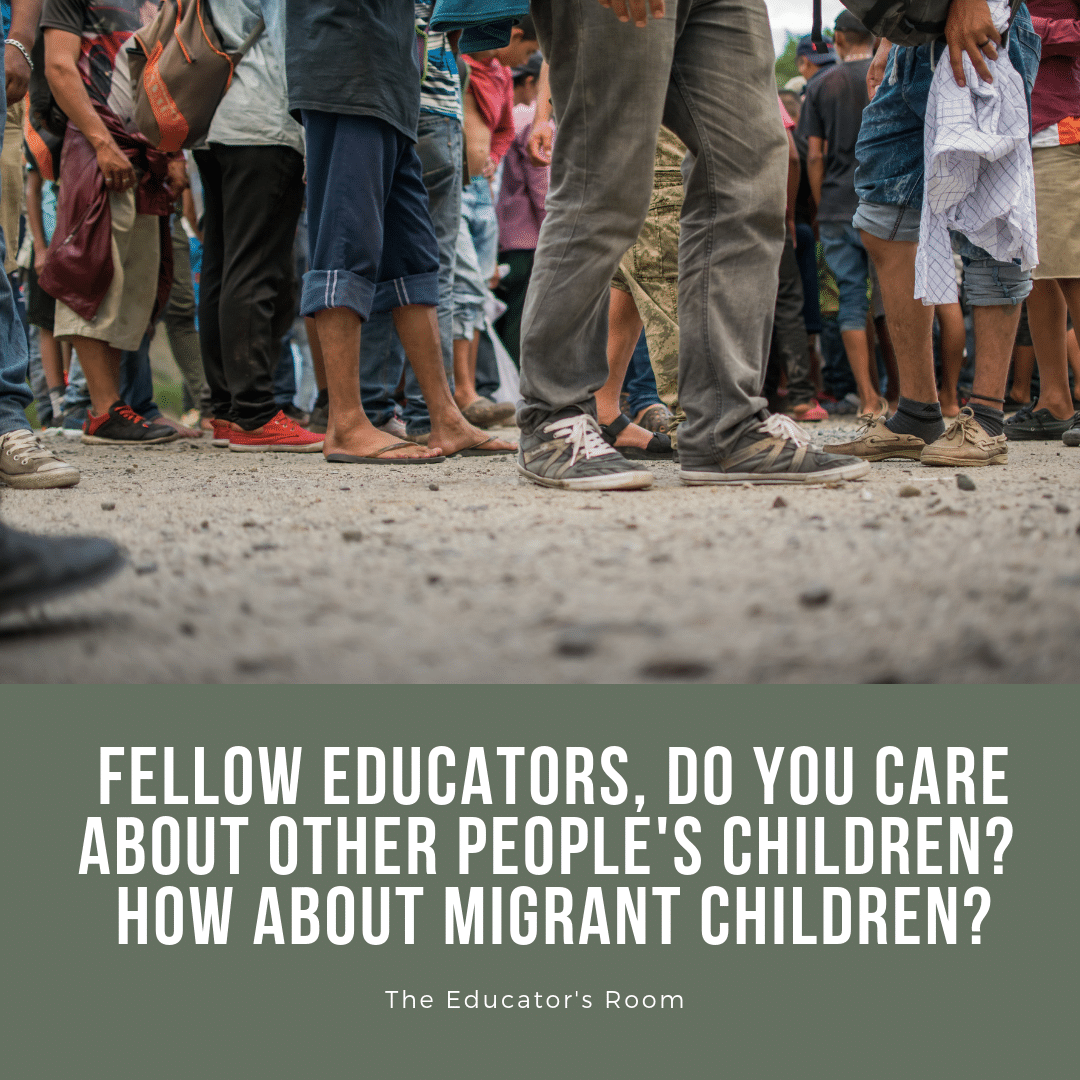Fellow educators, you have made a career centered around giving to children. You have worked diligently to become an expert in your curriculum, designing dynamic lessons while connecting to the whole child. You might even call the students on your rosters, “your kids.” With your compassion for other people’s children as a focus, I ask you to consider a deep question: Do you care about migrant children? When you scroll through your news feed, are you opening up the countless articles from reputable news sources concerning the treatment of these children, or are you simply sighing heavily and continuing on with your day? Do you feel powerless to affect change? Are you simply fatigued by the struggle of caring too much? Or, are you worried for your students during the next wave of ICE raids scheduled soon? Do you see your students in the faces of those detained in facilities across our nation? Or, do you teach in a school that is trying its best to teach migrant children, like the schools in South Florida?
[bctt tweet=”Do you care about migrant children?” username=””]
Fellow educators, now is the time to make a decision. Will you bring attention to the issue, or will you silently shake your head and move on with your summer plans? Will you claim it’s just government policy to arrest, detain, and separate asylum seekers? Or, will you reflect upon history and realize that our descendants might judge us harshly? They could look back on us and see us as intellectuals who knew better but did nothing. Are we like the people who supported the Fugitive Slave Laws of the 1800s or the Jim Crow Laws of the 1900s? Or, are we like the Germans who failed to protest the Nuremberg Laws of 1935? Even worse, we could be living near detention centers much like people who dwelled next to the Nazi death camps, refusing to recognize the smell. As teachers, are we voting for politicians who uphold immoral policies in the name of law and order? We must evaluate our roles. Are we perpetrators, bystanders, or upstanders?
Fellow educators, it is time for you to recognize some facts. Like most examples of discrimination, the United States is responsible for nativist policies. Some instances include the Chinese Exclusion Act of 1882, “No Irish Need Apply” signs in business window fronts, and the Emergency Quota Act of 1921, limiting immigration from a single country of origin to 3 percent. Names for immigrants include: aliens, illegals, foreigners, undesirables, outsiders, and migrants. There was also a political party called the Know Nothing Party, which had a platform in the 1850s that was anti-Catholic and extremely hostile to immigrants. Emma Lazarus’ poem is empty words chiseled onto the base of Lady Liberty. For hundreds of years, America has been telling the world we don’t want your tired nor your poor, and forget about any teeming masses yearning to breathe free. No, Americans continue to be satisfied they got theirs, and they are unwilling to share. Every generation of Americans has been xenophobic. The United States has an immigration problem because we do not value other people, and we definitely have not cared for their children. This undervaluing of children has also contributed to the mainstream disrespect for teachers and the important roles we fulfill.
Fellow educators, we are responsible for instilling civic virtues. We are the adults that stand with our students, hands over our hearts, reciting the pledge of allegiance every school day. We are the bearers of justice and opportunity. We must shine a light on the plight of migrant children and the conditions of child detention centers. These conditions have not begun with the current presidential administration, but they have worsened. Furthermore, the rhetoric around immigration and the clamoring to bolster border security has not helped migrant families remain together, or made it easier for them to seek a path to citizenship. Instead, fear has permeated. Students stop coming to school, hiding out from potential immigration raids.
Fellow educators, we can know better so that we can do better. According to Politifact’s “The facts behind the detention of immigrants,” 2019 saw a dramatic increase in border detention of migrants. This influx stresses the already flawed immigration system and allows private companies to profit from the administration of detention centers.
At the southwest border, Border Patrol made around 593,500 apprehensions in the first eight months of fiscal year 2019. In all of fiscal year 2018, it made close to 396,600 apprehensions…Children stay in shelters before being handed over to the care of a sponsor, often a parent in the United States, or another family member. Whether in federal care or with a sponsor, the children still go through immigration proceedings to determine whether they can remain in the United States.Private companies, as well as nonprofits, can be contracted by the government to run facilities holding migrant children. For instance, Caliburn International, a private for-profit company, runs a center in Homestead, Fla. A Texas nonprofit recently was announced to have received a $300 million contract to run a new temporary shelter for child migrants in Carrizo Springs, Texas, and provide 1,300 beds, according to a notice published July 2, 2019, in the Federal Register.
In 2016, The Southern Poverty Law Center conducted a seven-month-long study of the child detention centers–places where children are separated from their parents awaiting sponsorship from relatives or host families. The Southern Poverty Law Center cited abuse, neglect, and denial of basic human rights. Since 2016, numbers of immigrants have increased and conditions have worsened. A July 11, 2019, Time Magazine piece “What Is Happening at Migrant Detention Centers? Here’s What to Know,” outlines the conditions in these centers.
-
“Adults and children have been held for days, weeks, or even months in cramped cells, sometimes with no access to soap, toothpaste, or places to wash their hands or shower. Some reports have emerged of children sleeping on concrete floors; others of adults having to stand for days due to lack of space. A May report from the Department of Homeland Security’s inspector general found 900 people crammed into a space designed to accommodate 125 at most.”
-
“At an Arizona CBP facility, a 15-year-old girl from Honduras reported that an officer groped her during a patdown in front of other migrants and officers.”
-
“Babies have to drink from unwashed bottles and there are not enough diapers. They are subjected to “extreme cold temperatures” with “lights on 24 hours a day,” a pediatrician who has treated migrant children told CNN. There have been outbreaks of flu, lice, chicken pox and scabies.”
Fellow educators, we can act. There are over three million teachers in the United States. We can educate ourselves and others. We can use our voices to put politicians’ feet to the fire. We can join 2018 Teacher of the Year, Mandy Manning’s group: Teachers Against Child Detention. Teachers Against Child Detention (TACD) contends that teachers have a responsibility as mandated reporters to speak out on the mistreatment of a migrant child. The organization’s core beliefs include:
- All children deserve to be in school.
- All children deserve to be free.
- We demand the release of our children.
TACD shows us how teachers can act. Its website gives examples of action, including how we can teach about immigration and migration:
- PETITION: Sign our petition calling for the end of immigrant child detention.
-
MAKE A VIDEO: Make a short video calling on the U.S. government to end the detention and criminalization of immigrant children and their families, or email us a photograph of yourself and a statement in support of Teachers Against Child Detention. We will be using these videos and photographs on our website and across social media.
-
TEACH A LESSON: Teach a lesson to the students in your own classroom about freedom, and about the injustice of imprisoning kids who have done nothing wrong. Fellow The Educator’s Room author, Katie Sluiter, gives reasons for teaching with Alan Gratz’ novel Refugee in her piece:
“Teaching Immigration Empathy: Why Refugee by Alan Gratz Should Be Added To Your Curriculum”
-
HOLD YOUR OWN TEACH-IN IN YOUR COMMUNITY: Educate your community about the harm of detention, the reasons why the children came here, and what Americans can do to call upon our federal government to release the children and close these detention camps.
-
WRITE A LETTER TO THE EDITOR: Write a letter to the editor of your local newspaper calling on the U.S. government to end the detention and criminalization of immigrant children and their families. Get tips here.
Fellow educators, there is hope. But, we must be vigilant. We need to pay attention to this humanitarian crisis and hold people accountable. Politifact explains:
Another bill currently before a committee in the House of Representatives seeks to close temporary emergency shelters for unaccompanied minors. U.S. Rep. Judy Chu, D-Calif., in February introduced the Shut Down Child Prison Camps Act, to prohibit HHS from operating unlicensed temporary emergency shelters for unaccompanied immigrant children. The bill’s chances of getting through the Republican-controlled Senate, however, are low.







Awesome post, thanks for sharing.